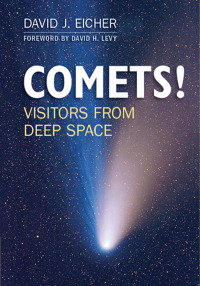Comets! by David J. Eicher
 Friday, December 6, 2013 at 9:54AM
Friday, December 6, 2013 at 9:54AM 
Published by Cambridge University Press on November 27, 2013
David J. Eicher is a lifelong fan of comets. His enthusiasm is reflected in the exclamation point in the book's title and in his discussion of the subject matter. Eicher isn't the most scintillating science writer I've encountered -- Comets! is disorganized and too often redundant -- but his prose is reasonably lively and he packs a good bit of interesting information into a fairly short book without becoming too "sciency." In other words, this is a book the casual reader can appreciate.
Eicher gives the reader a short history of comet observers, featuring familiar names like Thomas Aquinas, Edmond Halley, and Carl Sagan, as well as many that (to me, at least) are less well known. He devotes a later chapter to the hobby (or passion) of comet hunting. He catalogs comets that have coincided with historic events (Halley's Comet, in particular, has often been regarded as a good or bad omen, depending on what side of history the observer was rooting for). He discusses comets as a component of cultural history, from Aristotle and Seneca to Pliny the Elder and Ptolemy. Galileo, Kepler, and Newton were among the early astronomers who pondered and debated the nature of comets, as did Chinese sky watchers and Louis XIV. He also describes more recent observations of comets, some more interesting than others (Hale-Bopp, which was linked to the Heaven's Gate suicides, and Kohoutek, which turned out to be a dud as compared to predictions of the awe it would inspire, are the best of these). Eicher writes intriguing descriptions of "flybys" by spacecraft that have flown near (and sometimes into) comets and their tails, taking pictures and gathering samples. Several of the resulting photographs (which tend to reveal comets as rocks shaped like cosmic potatoes) are reproduced in the book.
A chapter that explains the composition of comets is a bit dry (although I appreciate Eicher's candor in admitting how much of that explanation is educated guesswork). It's interesting, in fact, to learn how little is known about comet formation and disintegration, about the differences between different comets, and about the unclear distinction between asteroids and comets. Did comets deliver the water and amino acids to Earth that made human life possible? Did comets, in fact, bring life to Earth? Are comets seeding life throughout the universe? Maybe, but many unanswered questions would need to be resolved before any of those possibilities could move from speculation to well-supported theory.
A chapter on where comets live and how they die is informative but, like other parts of the book, seems a bit padded with historical theories that have been supplanted by better information. A final chapter filled with technical tips for imaging comets will be of greater interest to night sky photographers than it was to me.
Of course, what we really want to know is whether a comet is likely to blast into the Earth's atmosphere and destroy all life on the planet (or maybe just Canada). A comet might have exploded over Siberia in 1908 but the jury is still out. Maybe it was an asteroid, not that it matters much to the Siberian tigers who were unlucky enough to be caught in the explosion. In any event, Eicher tells us that space debris pummels the Earth all the time and that Jupiter was smacked by a comet in 1994, so it's not inconceivable that a comet has Earth's number. With so many more imminent threats to human existence looming, I'm not going to lose sleep over that one.
RECOMMENDED